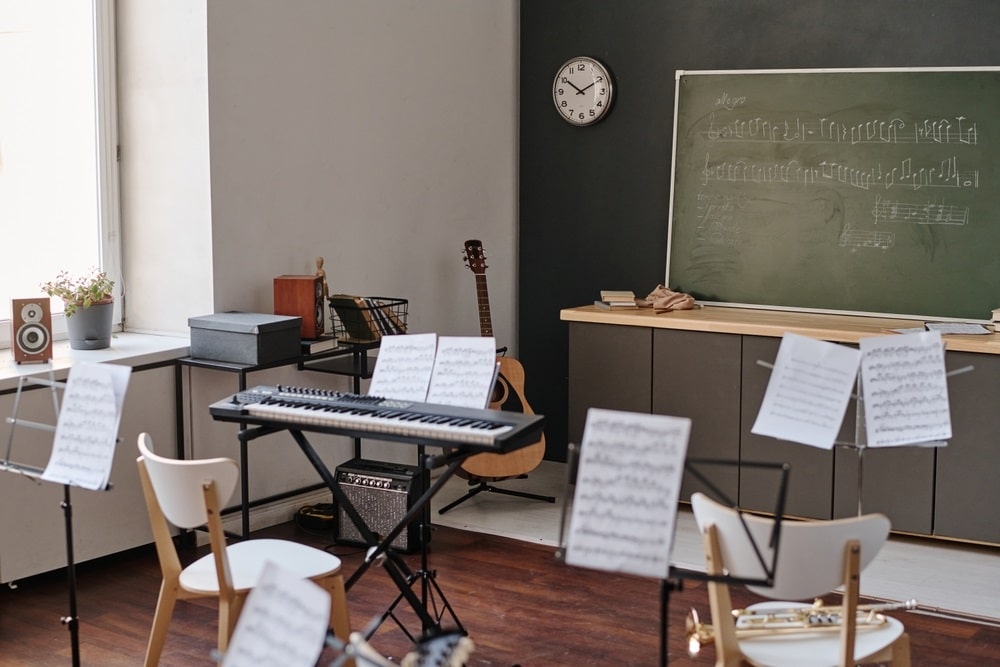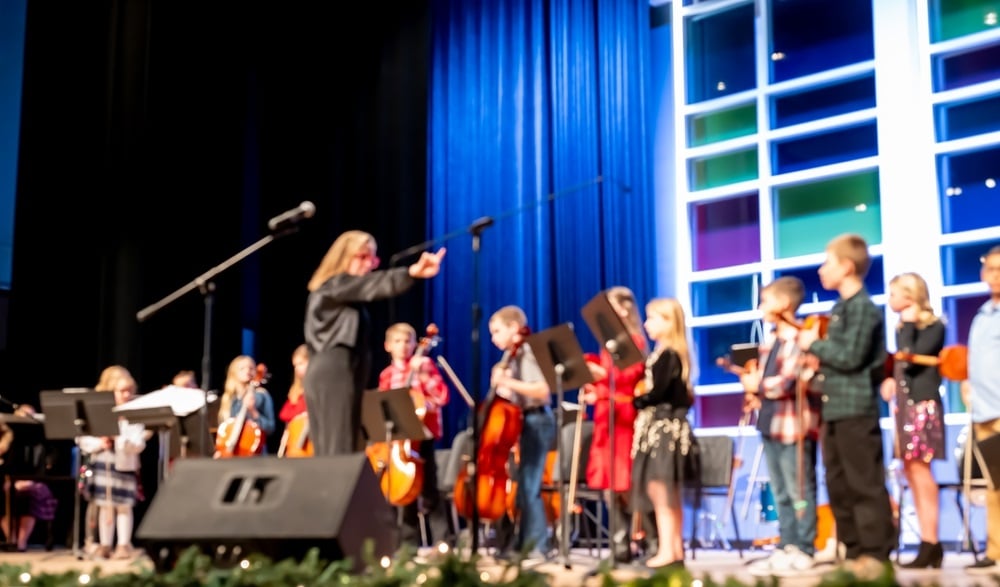
Coming from the standpoint of a seasoned teacher with over thirty years at the chalk face, I passionately believe in the importance of music education for all in schools.
Broadly speaking, it can be agreed that music education alongside other art subjects is now fully integrated into the National Curriculum in the United Kingdom.
With the establishment of the National Curriculum in England in 1992, music as a subject was formally recognized as an essential component of a child’s education.
Since 1992, the 33-page document has diminished considerably to a mere 209-word document (2013). This naturally raises many questions regarding the place and status of music in England that continue to be under review.
Nevertheless, music education continues across the world. It is taught in a variety of ways often with different pedagogies developed according to the needs of the school’s student body.
In some schools, music is of paramount importance, in others less so, however, the importance of its permanent inclusion in a well-rounded curriculum remains unchanged.
Music Education Importance in Schools
Global Approaches to Music Education in Schools
In the United Kingdom for instance, music commonly forms part of the programme of lessons students participate in until their GCSE (or equivalent) choices are made at the end of Key Stage 3. At this point, students can, if they choose to do so, take a GCSE in Music.
In other countries, in Europe, for instance, the school day has a different structure and a different curriculum model. For a great many schools in Germany, France, Italy and Austria for example, music comes as a separate subject after the school day is concluded. Music is then taught by specialist teachers in music schools.
In the USA I have seen some incredibly innovative approaches to learning music through what used to be referred to as the band scheme. What this involves is students, often grouped according to age, form a wind band, under the guidance and stewardship of a concertmaster.
Each student is given a wind instrument to study and supported throughout their journey by specialist teachers and the concertmaster. They progress in a real band setting with certificates for achievements and regular concert performances. The approach has created some extremely good wind bands.
It’s evident that music education is taking place in schools and institutions across the world to varying degrees. The content and quality of that education also varies although the importance of music to children is widely recognized and acknowledged.
Even though there may be a downward trend in music provision in some areas of education, the fact remains clearly in view about the benefits music education brings to students of all ages.
Challenges of the Global Pandemic
For many, the Global Pandemic was a significant turning point. With the series of lockdowns came an experience that many students will not have ever gone through before.
Isolation, social distancing, more autonomous requirements for school learning, and the ever-present threat of the Covid-19 virus. For large numbers of children/students and adults, music became increasingly vital to their survival.
The reasons for this seem to stem from the immense sense of well-being that music offered them alongside that all-important opportunity to find a newly creative pathway to self-expression.
For psychologists and educators alike, this was not a surprise. But despite the terrible cost to human life during the Pandemic, these overlooked advantages that active participation in music presented re-emerged.
A study by Jian Sun from the School of Music and Dance (Xihua University, China: Organisational Psychology: volume 13;2022), highlights the enormous importance of music both during the Pandemic and in the following years.
Tens of thousands of people struggled during the lockdowns with mental health help centres overwhelmed constantly. Music became, for many, a coping mechanism.
The Impact of Music Education on Creativity and Psychological Well-Being
Several phrases stand out in the research that beautifully illustrate some of the large number of advantages music brings at education, social and psychological levels.
“While (music) stimulating learners’ vision and imagination, music education may enhance students’ passions, sentiments, and other non-intellectual variables, fulfilling the goal of nurturing students’ inventive identities.”
It is even suggested that music education can greatly help students overcome certain unwanted personality traits whilst enhancing self-confidence and self-efficacy.
In conclusion, the study states that “music education has a significant impact on students’ psychological well-being and academic performance. Self-esteem and self-efficacy mediate the relationship between music education and psychological well-being.”
This is not an isolated piece of research. One individual I hold in very high regard is Sir Ken Robinson (1950-2020). His illuminating, inspired and revolutionary TED talks shed new light on how education can and perhaps should be approached.
These talks have received over 52 million views with Do Schools Kill Creativity? the most-watched TED talk of all time. One of his many key points is that we as a populace are educated to be good workers, not creative thinkers. Here music education can and indeed should supply that avenue for every student.
At the heart of Robinson’s arguments is creativity. He claims that it is as important as literacy. “Curiosity is the engine of achievement,” and “Imagination is the source of all human achievement.”
What I particularly like is that Robinson does not single out The arts or Music as the magic bullet that offers a solution to all educational stumbling points, but that all subjects, if taught in the way he suggests can be creative.
The Unique Power of Music
For music as a subject, the opportunity for creativity, imagination, individuality and personal well-being is virtually in-built. This is true for all Art subjects, but for me, I believe music has the potential to connect to us in a more direct way than other Arts.
I’m not placing music on a pedestal, but highlighting the different nature of music. There is something about the combination of musical elements that resonates with nearly everyone and gives a golden opportunity for further exploration.
It can be passively received through hearing it, but I would suggest it has even more benefits when it is actively engaged with. By this, I mean purposefully listening or playing or singing. Combined with dance, it only multiplies the benefits.
Music opens doors for us all. It can be a non-judgemental method of free self-expression through to a tailored, refined performance of a challenging concerto; and so much more.
Music education in the classroom, in concert halls, in private tuition, in ensembles, choirs, orchestras, bands, and more, brings us together as human beings, recognizes our diversities, and embraces them.
It encourages and nurtures creativity and the free flow of imagination. It celebrates mistakes as happy accidents from which we can all grow.
It promotes lifelong learning, opening that can be with us through every high and low, filling us with reassurance, and bringing compassion and light into our lives.



Great article! …to be shared.
thank you